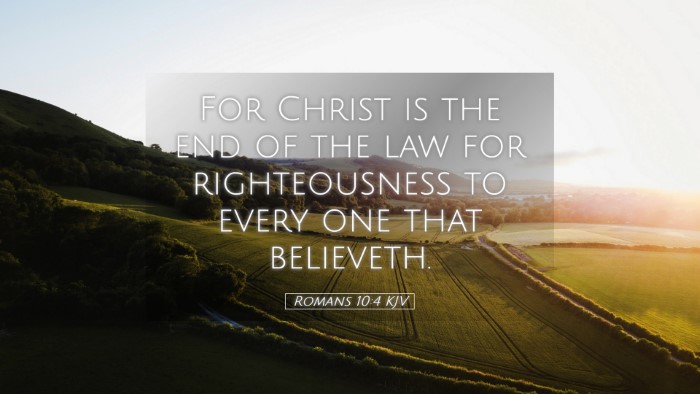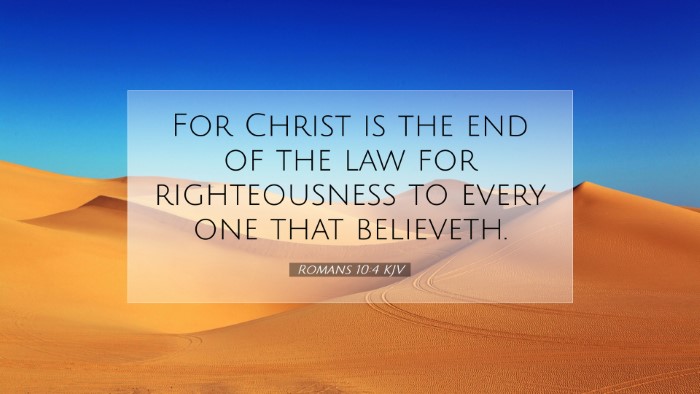Old Testament
Genesis Exodus Leviticus Numbers Deuteronomy Joshua Judges Ruth 1 Samuel 2 Samuel 1 Kings 2 Kings 1 Chronicles 2 Chronicles Ezra Nehemiah Esther Job Psalms Proverbs Ecclesiastes Song of Solomon Isaiah Jeremiah Lamentations Ezekiel Daniel Hosea Joel Amos Obadiah Jonah Micah Nahum Habakkuk Zephaniah Haggai Zechariah MalachiRomans 10:4
Romans 10:4 KJV
For Christ is the end of the law for righteousness to every one that believeth.
Romans 10:4 Bible Commentary
Commentary on Romans 10:4
Verse Context: Romans 10:4 states, "For Christ is the end of the law for righteousness to everyone who believes." This succinct but profound declaration encapsulates the culmination of the Mosaic Law in Jesus Christ, making it a pivotal text for understanding the relationship between faith, law, and salvation.
Exegesis and Theological Insights
Historical Context
The Apostle Paul, writing to the Roman church, sought to clarify the implications of faith in Christ concerning the law. At the time, there was considerable tension between Jewish Christians who adhered to the Law and Gentile Christians who embraced faith alone. In Romans, Paul systematically addressed these issues, underscoring how faith in Christ radically transforms the believer's relationship with the Law.
Meaning of "End of the Law"
Matthew Henry comments that "the end of the law" signifies both the cessation of its demands and the fulfillment of its purpose in Christ. The law was intended to lead people to Christ, highlighting their sinfulness and need for redemption. Once Christ accomplished His work, the law's role as a strict schoolmaster concluded.
Albert Barnes elaborates, stating that Christ is the conclusion or goal of the law, that it is in him that righteousness is fully realized. Believers, through faith, achieve a righteousness that surpasses the mere adherence to the commandments.
Adam Clarke further emphasizes that the term "end" can be understood in a dual sense: it signifies both termination and purpose. The Mosaic Law, with its rituals and sacrifices, is completed in the saving work of Christ, rendering it obsolete for achieving righteousness before God.
Theological Implications
Faith vs. Works
This verse introduces a critical theological distinction between achieving righteousness through personal works under the law versus receiving righteousness through faith in Christ. Henry asserts that believers are justified not by the law but by faith, which offers a profound relief from the burden of the law's demands.
Barnes reinforces this by highlighting that righteousness is no longer bound by the impossible standards of the law but is given freely through belief in Christ. This paves the way for a new understanding of righteousness as something that is imputed, not earned.
Clarke underscores that the transition from law to grace necessitates a radical shift in thinking about God’s redemptive plan. Righteousness is now a gift to be received, a principle that fundamentally alters how believers live and relate to God.
Application for Believers
The implications of this verse are profound for contemporary believers:
- Identity in Christ: Believers are united with Christ and defined by their relationship with Him rather than their adherence to the law.
- Freedom from Condemnation: Knowing that Christ fulfills the law liberates believers from the guilt and condemnation of their failures to fully adhere to it.
- A Call to Faith: The verse invites all to an active faith that trusts in Christ for righteousness, indicative of a life transformed by grace.
Conclusion
In Romans 10:4, Paul powerfully encapsulates the essence of the Gospel—Jesus Christ as the fulfillment of the law offers righteousness to all who believe. As noted by Henry, Barnes, and Clarke, this truth transforms the believer's life, calls for a faith that upholds the grace extended through Christ, and heralds a new era of hope and freedom from the law's demands. For pastors, theologians, and lay believers alike, this verse stands as a clarion call to embrace the finished work of Christ in our understanding of salvation and righteousness.


